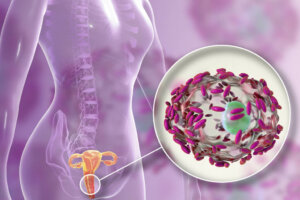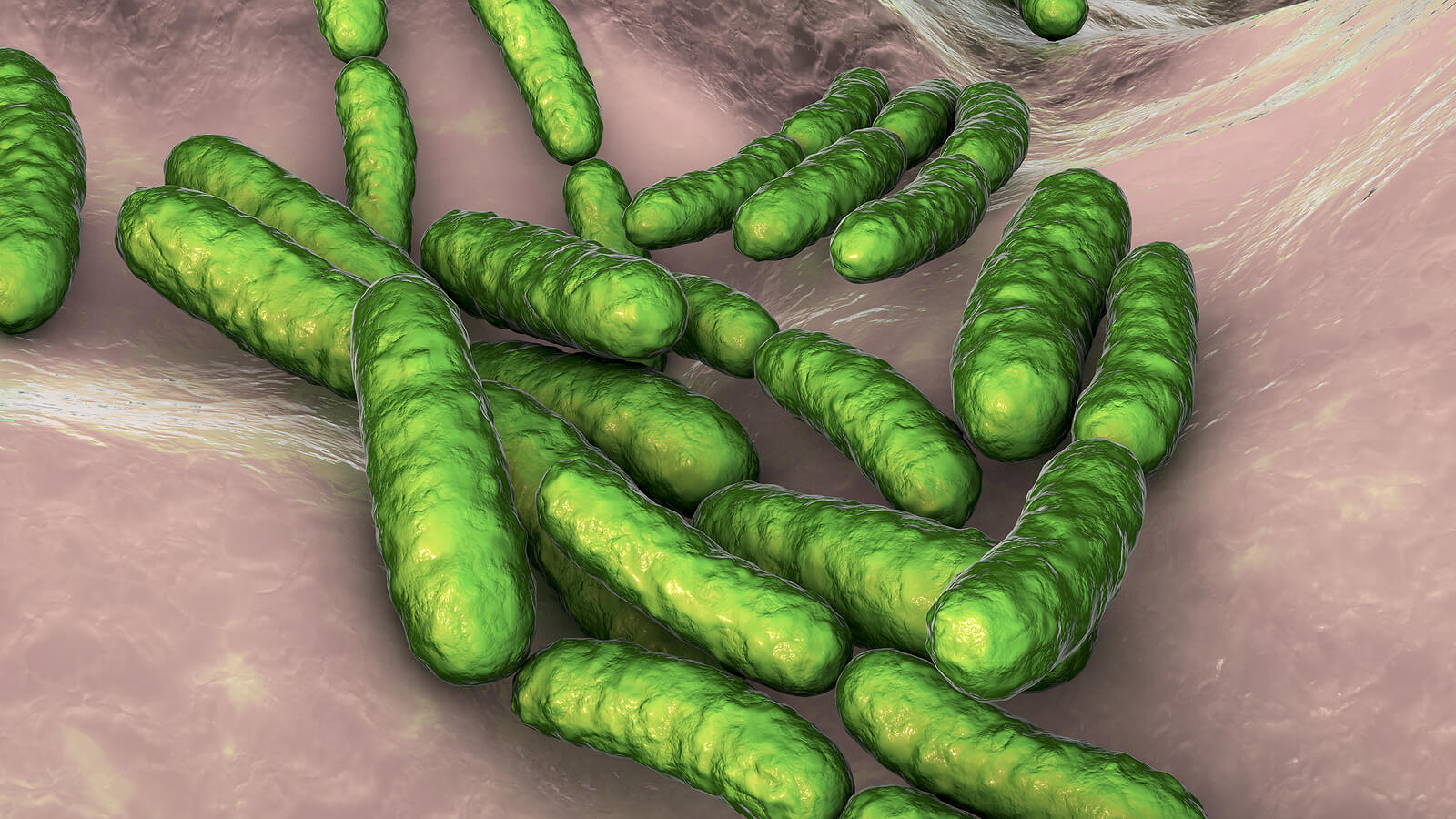Vaginal Flora: What It Is and How to Care for It

Vaginal flora is the name given to the microorganisms that colonize that particular area of a woman’s body. This includes a group of beneficial bacteria that create a healthy microbiome and keep it free from other organisms that tend to cause infections and diseases. These beneficial bacteria thrive in microbiota with an ideal pH.
So, you should bear in mind that the vaginal pH, during the reproductive years, should oscillate between 3.8 and 4.5, which is moderate acidity. Before menarche and once menopause has arrived, a healthy pH should be higher than 4.5, tending towards basic or alkaline. Find out more about vaginal flora and how to take care of it below.
Functions of vaginal flora

Vaginal flora intervenes in the different physiological processes that develop in this organ, such as helping the integrity and proper functioning of the mucus or vaginal wall.
In turn, it keeps other bacteria that are considered to be pathogens at bay, such as those that come from the large intestine or occur through sexual transmission. This prevents them from adhering to the mucous membranes, decimating their food source, or degrading foreign substances that can be harmful, for example.
Likewise, it contributes to immune development in the fight against infections, as well as providing the bioavailability of nutrients for beneficial bacteria that inhabit the vaginal ecosystem, and helping to produce antimicrobial substances. In this way, the vaginal flora creates a kind of protective barrier that corrects some imbalances and maintains a healthy vagina.
What causes vaginal flora imbalance?
Under normal conditions, the vaginal ecosystem is balanced, but there are both internal and external factors that, without prior warning, can alter this state. We’ll mention some:
- Having unprotected sex. The alkalinity of semen promotes the growth of some types of bacteria that are foreign to the vaginal microbiota.
- The use of antibiotics. These medications don’t only fight bacterial infections, but they also inhibit the growth and proper functioning of the “good bacteria” necessary to keep the vagina healthy.
- Excessive use of douches (including perfumes, powders, or sprays). Most of these products contain vinegar, alcohol, sodium bicarbonate, and iodine, substances that increase vaginal pH values, affect acidity, and contribute to the growth of harmful bacteria.
- The phase of the menstrual cycle. During this stage, the concentration of good bacteria in the vaginal bacterial flora decreases. As a result, this can trigger the appearance of infections.
- The arrival of menopause. The passing of the years affects the correct functioning of the vaginal flora, so infections in that area tend to be frequent.
- Sexual activity under the influence of alcohol. When under the influence of alcohol, sex is often unprotected and, in some cases, semen could impair the balance of flora.
- Pregnancy During pregnancy, the woman’s pH is altered, which is why, during this stage, women are more prone to infections.
Other factors to consider are the use of some contraceptive methods, the lack of hygiene habits, and the use of tampons. Tight clothing that isn’t breathable can cause problems if there’s an infection, as can the intake of certain types of food or even frequent sex with different partners.
Diseases and symptoms that can arise when vaginal flora is altered

When the vagina’s pH level is high, it triggers a series of symptomatic conditions that alert you when something’s wrong in your intimate area. These can include itching, burning when urinating, bad odor, and unusual colored discharges. These tend to lead to more serious diseases, but they’re curable with medical treatment.
Bacterial vaginosis (BV)
This occurs due to the exponential growth of the number of bad bacteria that naturally inhabit the vagina. In a balanced vagina, the number of good bacteria, generally of the Lactobacillus genus, is greater than the number of bad bacteria, which have anaerobic metabolism (that is, they don’t require oxygen).
However, when, for some reason, the presence of anaerobes increases considerably, the natural balance of microorganisms in the vagina is upset and gives way to bacterial vaginosis.
The presence of this disease makes women more vulnerable to contracting the human papillomavirus (HPV), the herpes simplex virus (HSV), or even the human immunodeficiency virus (HIV).
Trichomoniasis
In general, this disease doesn’t thrive in an acid vagina, as the causative germ doesn’t grow in these types of environments. Also, this parasite is transmitted through the exchange of fluids that occurs during sexual intercourse.
Although most people infected with trichomoniasis have no symptoms, according to some studies it may increase the risk of contracting other sexually transmitted diseases (STDs).
Could contribute to infertility
While it’s true that infertility isn’t a disease, this condition affects many women. A vagina that’s too acidic reduces fertility, because sperm thrive in an alkaline environment.
Therefore, during sexual intercourse, the pH level of the vagina rises and makes it more alkaline, in order to protect the sperm during their journey to the egg.
How to take care of balanced vaginal flora?
Precaution is always better than curing the disease. Therefore, we recommend some tips to keep your vaginal pH at a healthy level:
- Try to use a condom whenever you have sex, especially if this person is not a stable partner. In this way, you won’t only protect yourself from STDs, but you’ll also prevent semen from altering vaginal pH levels.
- Avoid using douches or any other product that can alter the vaginal microbiota, especially those that aren’t odorless. Keep in mind that vaginas clean themselves, and so you should only wash the vulva with water.
In case of suffering some of the symptoms or diseases mentioned, avoid self-medicating and go to a specialist. They’ll prescribe an appropriate treatment for your condition.
Keep the vaginal flora healthy
Taking probiotics and having safe sex may help maintain the balance of good and bad bacteria in the vagina. Remember that very frequent douching is not recommended, especially if you use products such as vinegar or scented soap.
In case of having a bad smell, itching, or burning in the intimate area, make an appointment with your trusted gynecologist, as you could be suffering from a bad infection that needs suitable medication.
Vaginal flora is the name given to the microorganisms that colonize that particular area of a woman’s body. This includes a group of beneficial bacteria that create a healthy microbiome and keep it free from other organisms that tend to cause infections and diseases. These beneficial bacteria thrive in microbiota with an ideal pH.
So, you should bear in mind that the vaginal pH, during the reproductive years, should oscillate between 3.8 and 4.5, which is moderate acidity. Before menarche and once menopause has arrived, a healthy pH should be higher than 4.5, tending towards basic or alkaline. Find out more about vaginal flora and how to take care of it below.
Functions of vaginal flora

Vaginal flora intervenes in the different physiological processes that develop in this organ, such as helping the integrity and proper functioning of the mucus or vaginal wall.
In turn, it keeps other bacteria that are considered to be pathogens at bay, such as those that come from the large intestine or occur through sexual transmission. This prevents them from adhering to the mucous membranes, decimating their food source, or degrading foreign substances that can be harmful, for example.
Likewise, it contributes to immune development in the fight against infections, as well as providing the bioavailability of nutrients for beneficial bacteria that inhabit the vaginal ecosystem, and helping to produce antimicrobial substances. In this way, the vaginal flora creates a kind of protective barrier that corrects some imbalances and maintains a healthy vagina.
What causes vaginal flora imbalance?
Under normal conditions, the vaginal ecosystem is balanced, but there are both internal and external factors that, without prior warning, can alter this state. We’ll mention some:
- Having unprotected sex. The alkalinity of semen promotes the growth of some types of bacteria that are foreign to the vaginal microbiota.
- The use of antibiotics. These medications don’t only fight bacterial infections, but they also inhibit the growth and proper functioning of the “good bacteria” necessary to keep the vagina healthy.
- Excessive use of douches (including perfumes, powders, or sprays). Most of these products contain vinegar, alcohol, sodium bicarbonate, and iodine, substances that increase vaginal pH values, affect acidity, and contribute to the growth of harmful bacteria.
- The phase of the menstrual cycle. During this stage, the concentration of good bacteria in the vaginal bacterial flora decreases. As a result, this can trigger the appearance of infections.
- The arrival of menopause. The passing of the years affects the correct functioning of the vaginal flora, so infections in that area tend to be frequent.
- Sexual activity under the influence of alcohol. When under the influence of alcohol, sex is often unprotected and, in some cases, semen could impair the balance of flora.
- Pregnancy During pregnancy, the woman’s pH is altered, which is why, during this stage, women are more prone to infections.
Other factors to consider are the use of some contraceptive methods, the lack of hygiene habits, and the use of tampons. Tight clothing that isn’t breathable can cause problems if there’s an infection, as can the intake of certain types of food or even frequent sex with different partners.
Diseases and symptoms that can arise when vaginal flora is altered

When the vagina’s pH level is high, it triggers a series of symptomatic conditions that alert you when something’s wrong in your intimate area. These can include itching, burning when urinating, bad odor, and unusual colored discharges. These tend to lead to more serious diseases, but they’re curable with medical treatment.
Bacterial vaginosis (BV)
This occurs due to the exponential growth of the number of bad bacteria that naturally inhabit the vagina. In a balanced vagina, the number of good bacteria, generally of the Lactobacillus genus, is greater than the number of bad bacteria, which have anaerobic metabolism (that is, they don’t require oxygen).
However, when, for some reason, the presence of anaerobes increases considerably, the natural balance of microorganisms in the vagina is upset and gives way to bacterial vaginosis.
The presence of this disease makes women more vulnerable to contracting the human papillomavirus (HPV), the herpes simplex virus (HSV), or even the human immunodeficiency virus (HIV).
Trichomoniasis
In general, this disease doesn’t thrive in an acid vagina, as the causative germ doesn’t grow in these types of environments. Also, this parasite is transmitted through the exchange of fluids that occurs during sexual intercourse.
Although most people infected with trichomoniasis have no symptoms, according to some studies it may increase the risk of contracting other sexually transmitted diseases (STDs).
Could contribute to infertility
While it’s true that infertility isn’t a disease, this condition affects many women. A vagina that’s too acidic reduces fertility, because sperm thrive in an alkaline environment.
Therefore, during sexual intercourse, the pH level of the vagina rises and makes it more alkaline, in order to protect the sperm during their journey to the egg.
How to take care of balanced vaginal flora?
Precaution is always better than curing the disease. Therefore, we recommend some tips to keep your vaginal pH at a healthy level:
- Try to use a condom whenever you have sex, especially if this person is not a stable partner. In this way, you won’t only protect yourself from STDs, but you’ll also prevent semen from altering vaginal pH levels.
- Avoid using douches or any other product that can alter the vaginal microbiota, especially those that aren’t odorless. Keep in mind that vaginas clean themselves, and so you should only wash the vulva with water.
In case of suffering some of the symptoms or diseases mentioned, avoid self-medicating and go to a specialist. They’ll prescribe an appropriate treatment for your condition.
Keep the vaginal flora healthy
Taking probiotics and having safe sex may help maintain the balance of good and bad bacteria in the vagina. Remember that very frequent douching is not recommended, especially if you use products such as vinegar or scented soap.
In case of having a bad smell, itching, or burning in the intimate area, make an appointment with your trusted gynecologist, as you could be suffering from a bad infection that needs suitable medication.
- Restrepo, V., Velásquez, V., Puerta, J., Cardona, W. D. (2021). Flujo vaginal y semen: La microbiota de las relaciones sexuales. Revista Urología Colombiana. https://doi.org/10.1055/s-0040-1721325
- Ahrens, P., Andersen, L. O., Lilje, B., Johannesen, T. B., Dahl, E. G., Baig, S., Jensen, J. S., & Falk, L. (2020). Changes in the vaginal microbiota following antibiotic treatment for Mycoplasma genitalium, Chlamydia trachomatis and bacterial vaginosis. PloS one, 15(7), e0236036. https://doi.org/10.1371/journal.pone.0236036
- Martino, J. L., & Vermund, S. H. (2002). Vaginal douching: evidence for risks or benefits to women’s health. Epidemiologic reviews, 24(2), 109–124. https://doi.org/10.1093/epirev/mxf004
- Kourtis, A. P., Read, J. S., & Jamieson, D. J. (2014). Pregnancy and infection. The New England journal of medicine, 370(23), 2211–2218. https://doi.org/10.1056/NEJMra1213566
- Schwebke, J. R., & Burgess, D. (2004). Trichomoniasis. Clinical microbiology reviews, 17(4), 794–803. https://doi.org/10.1128/CMR.17.4.794-803.2004
- Nakano, Fabiana Y., Leão, Rogério de Barros F., & Esteves, Sandro C.. (2015). Insights into the role of cervical mucus and vaginal pH in unexplained infertility. MedicalExpress, 2(2), M150207. https://dx.doi.org/10.5935/MedicalExpress.2015.02.07
Este texto se ofrece únicamente con propósitos informativos y no reemplaza la consulta con un profesional. Ante dudas, consulta a tu especialista.







